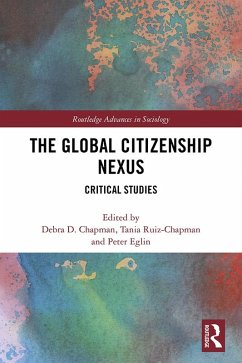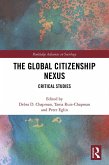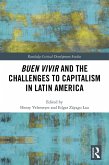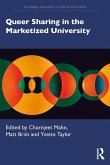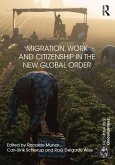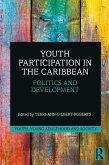The Global Citizenship Nexus (eBook, PDF)
Critical Studies
Redaktion: Chapman, Debra; Eglin, Peter; Ruiz-Chapman, Tania
43,95 €
43,95 €
inkl. MwSt.
Sofort per Download lieferbar

22 °P sammeln
43,95 €
Als Download kaufen

43,95 €
inkl. MwSt.
Sofort per Download lieferbar

22 °P sammeln
Jetzt verschenken
Alle Infos zum eBook verschenken
43,95 €
inkl. MwSt.
Sofort per Download lieferbar
Alle Infos zum eBook verschenken

22 °P sammeln
The Global Citizenship Nexus (eBook, PDF)
Critical Studies
Redaktion: Chapman, Debra; Eglin, Peter; Ruiz-Chapman, Tania
- Format: PDF
- Merkliste
- Auf die Merkliste
- Bewerten Bewerten
- Teilen
- Produkt teilen
- Produkterinnerung
- Produkterinnerung

Bitte loggen Sie sich zunächst in Ihr Kundenkonto ein oder registrieren Sie sich bei
bücher.de, um das eBook-Abo tolino select nutzen zu können.
Hier können Sie sich einloggen
Hier können Sie sich einloggen
Sie sind bereits eingeloggt. Klicken Sie auf 2. tolino select Abo, um fortzufahren.

Bitte loggen Sie sich zunächst in Ihr Kundenkonto ein oder registrieren Sie sich bei bücher.de, um das eBook-Abo tolino select nutzen zu können.
In the spirit of Ivan Illich's 1968 speech 'To hell with good intentions', the book takes aim at a ubiquitous form of contemporary ideology, namely the concept of global citizenship.
- Geräte: PC
- mit Kopierschutz
- eBook Hilfe
Andere Kunden interessierten sich auch für
![The Global Citizenship Nexus (eBook, ePUB) The Global Citizenship Nexus (eBook, ePUB)]() The Global Citizenship Nexus (eBook, ePUB)43,95 €
The Global Citizenship Nexus (eBook, ePUB)43,95 €![Buen Vivir and the Challenges to Capitalism in Latin America (eBook, PDF) Buen Vivir and the Challenges to Capitalism in Latin America (eBook, PDF)]() Buen Vivir and the Challenges to Capitalism in Latin America (eBook, PDF)43,95 €
Buen Vivir and the Challenges to Capitalism in Latin America (eBook, PDF)43,95 €![The State-Capital Nexus in the Global Crisis (eBook, PDF) The State-Capital Nexus in the Global Crisis (eBook, PDF)]() The State-Capital Nexus in the Global Crisis (eBook, PDF)54,95 €
The State-Capital Nexus in the Global Crisis (eBook, PDF)54,95 €![Queer Sharing in the Marketized University (eBook, PDF) Queer Sharing in the Marketized University (eBook, PDF)]() Queer Sharing in the Marketized University (eBook, PDF)39,95 €
Queer Sharing in the Marketized University (eBook, PDF)39,95 €![The Enigma of Social Harm (eBook, PDF) The Enigma of Social Harm (eBook, PDF)]() Thomas RaymenThe Enigma of Social Harm (eBook, PDF)23,95 €
Thomas RaymenThe Enigma of Social Harm (eBook, PDF)23,95 €![Migration, Work and Citizenship in the New Global Order (eBook, PDF) Migration, Work and Citizenship in the New Global Order (eBook, PDF)]() Migration, Work and Citizenship in the New Global Order (eBook, PDF)54,95 €
Migration, Work and Citizenship in the New Global Order (eBook, PDF)54,95 €![Youth Participation in the Caribbean (eBook, PDF) Youth Participation in the Caribbean (eBook, PDF)]() Youth Participation in the Caribbean (eBook, PDF)43,95 €
Youth Participation in the Caribbean (eBook, PDF)43,95 €-
-
-
In the spirit of Ivan Illich's 1968 speech 'To hell with good intentions', the book takes aim at a ubiquitous form of contemporary ideology, namely the concept of global citizenship.
Dieser Download kann aus rechtlichen Gründen nur mit Rechnungsadresse in A, B, BG, CY, CZ, D, DK, EW, E, FIN, F, GR, HR, H, IRL, I, LT, L, LR, M, NL, PL, P, R, S, SLO, SK ausgeliefert werden.
Produktdetails
- Produktdetails
- Verlag: Taylor & Francis eBooks
- Seitenzahl: 282
- Erscheinungstermin: 8. April 2020
- Englisch
- ISBN-13: 9781000062786
- Artikelnr.: 59190553
- Verlag: Taylor & Francis eBooks
- Seitenzahl: 282
- Erscheinungstermin: 8. April 2020
- Englisch
- ISBN-13: 9781000062786
- Artikelnr.: 59190553
- Herstellerkennzeichnung Die Herstellerinformationen sind derzeit nicht verfügbar.
Debra D. Chapman is a professor teaching in of Global Studies, Political Science and North American Studies at Wilfrid Laurier University. She has authored The struggle for Mexico: state corporatism and popular opposition (2012). Tania Ruiz-Chapman is a PhD candidate in Social Justice Education at the Ontario Institute for Studies in Education of the University of Toronto. Peter Eglin is Emeritus Professor of Sociology, Wilfrid Laurier University. His publications include The Montreal massacre: a story of membership categorization analysis (2003) and A sociology of crime (2nd edn., 2017), both with Stephen Hester.
Part I: Stance and Origin
1. Introduction
2. Global Citizenship Education and The Making of America's Neoliberal Empire
Part II: Borders and Global Non-Citizenship
3. The Cartesian Subject as Global Citizen, the Migrant as Non-human: Humanity, Subjectivity and Citizenship at the U.S.-Mexican Border
4. Global Capitalism, Immanent Borders, and Corporeal Citizenship
Part III: Global Citizenship and the Universities
5. Global Citizenship in the Neoliberal Canadian University
6. Global Citizenship Education and its Discontents, from the Global North to the Global South
Part IV: Global Citizenship and the International Institutions
7. Global Citizenship and Neo-Republicanism? Problematising the 'Neoliberal Subjectivities' Critique
8. International Policy Influencers and their Agendas on Global Citizenship: A Critical Analysis of OECD and UNESCO Discourses
Part V: Global Citizenship and the Benevolent Actors
9. Benevolence, Global Citizenship, and Post-Racial Politics
10. The Social Entrepreneur as Global Citizen: A Critical Appraisal of a Theory of Social Change
Part VI: Global Citizenship and the Multi/Trans-National Corporations
11. Constructing 'Progressive Neoliberal' Citizens: The Political Economy of Corporate Global Imaginaries
12. The Empire of 'Global Civil Society': Corporations, NGOs, and International Development
1. Introduction
2. Global Citizenship Education and The Making of America's Neoliberal Empire
Part II: Borders and Global Non-Citizenship
3. The Cartesian Subject as Global Citizen, the Migrant as Non-human: Humanity, Subjectivity and Citizenship at the U.S.-Mexican Border
4. Global Capitalism, Immanent Borders, and Corporeal Citizenship
Part III: Global Citizenship and the Universities
5. Global Citizenship in the Neoliberal Canadian University
6. Global Citizenship Education and its Discontents, from the Global North to the Global South
Part IV: Global Citizenship and the International Institutions
7. Global Citizenship and Neo-Republicanism? Problematising the 'Neoliberal Subjectivities' Critique
8. International Policy Influencers and their Agendas on Global Citizenship: A Critical Analysis of OECD and UNESCO Discourses
Part V: Global Citizenship and the Benevolent Actors
9. Benevolence, Global Citizenship, and Post-Racial Politics
10. The Social Entrepreneur as Global Citizen: A Critical Appraisal of a Theory of Social Change
Part VI: Global Citizenship and the Multi/Trans-National Corporations
11. Constructing 'Progressive Neoliberal' Citizens: The Political Economy of Corporate Global Imaginaries
12. The Empire of 'Global Civil Society': Corporations, NGOs, and International Development
Part I: Stance and Origin
1. Introduction
2. Global Citizenship Education and The Making of America's Neoliberal Empire
Part II: Borders and Global Non-Citizenship
3. The Cartesian Subject as Global Citizen, the Migrant as Non-human: Humanity, Subjectivity and Citizenship at the U.S.-Mexican Border
4. Global Capitalism, Immanent Borders, and Corporeal Citizenship
Part III: Global Citizenship and the Universities
5. Global Citizenship in the Neoliberal Canadian University
6. Global Citizenship Education and its Discontents, from the Global North to the Global South
Part IV: Global Citizenship and the International Institutions
7. Global Citizenship and Neo-Republicanism? Problematising the 'Neoliberal Subjectivities' Critique
8. International Policy Influencers and their Agendas on Global Citizenship: A Critical Analysis of OECD and UNESCO Discourses
Part V: Global Citizenship and the Benevolent Actors
9. Benevolence, Global Citizenship, and Post-Racial Politics
10. The Social Entrepreneur as Global Citizen: A Critical Appraisal of a Theory of Social Change
Part VI: Global Citizenship and the Multi/Trans-National Corporations
11. Constructing 'Progressive Neoliberal' Citizens: The Political Economy of Corporate Global Imaginaries
12. The Empire of 'Global Civil Society': Corporations, NGOs, and International Development
1. Introduction
2. Global Citizenship Education and The Making of America's Neoliberal Empire
Part II: Borders and Global Non-Citizenship
3. The Cartesian Subject as Global Citizen, the Migrant as Non-human: Humanity, Subjectivity and Citizenship at the U.S.-Mexican Border
4. Global Capitalism, Immanent Borders, and Corporeal Citizenship
Part III: Global Citizenship and the Universities
5. Global Citizenship in the Neoliberal Canadian University
6. Global Citizenship Education and its Discontents, from the Global North to the Global South
Part IV: Global Citizenship and the International Institutions
7. Global Citizenship and Neo-Republicanism? Problematising the 'Neoliberal Subjectivities' Critique
8. International Policy Influencers and their Agendas on Global Citizenship: A Critical Analysis of OECD and UNESCO Discourses
Part V: Global Citizenship and the Benevolent Actors
9. Benevolence, Global Citizenship, and Post-Racial Politics
10. The Social Entrepreneur as Global Citizen: A Critical Appraisal of a Theory of Social Change
Part VI: Global Citizenship and the Multi/Trans-National Corporations
11. Constructing 'Progressive Neoliberal' Citizens: The Political Economy of Corporate Global Imaginaries
12. The Empire of 'Global Civil Society': Corporations, NGOs, and International Development
